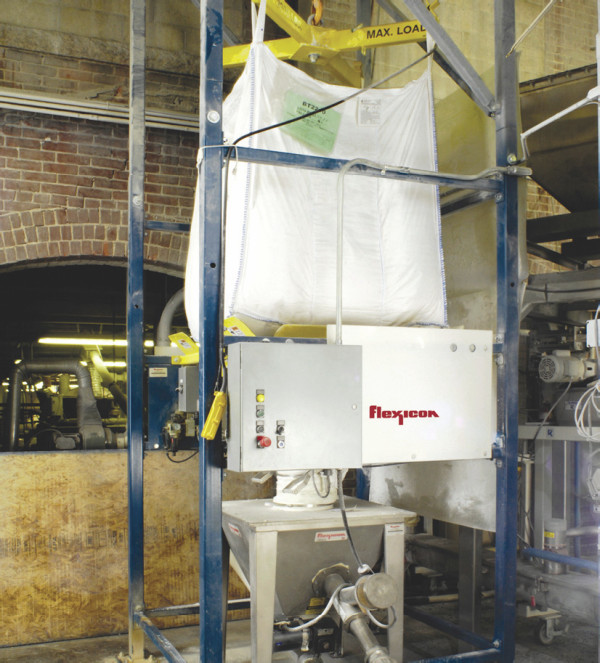 The Plastics Group has invested in a second bulk bag discharger and flexible screw conveyor from Flexicon, overcoming the issue of restricted headroom at the plant
The Plastics Group has invested in a second bulk bag discharger and flexible screw conveyor from Flexicon, overcoming the issue of restricted headroom at the plant
Six years after a Flexicon bulk bag discharger and screw conveyor operation first went live at The Plastics Group’s production facility in Woonsocket, Rhodes Island the company has re-invested in a duplicate Flexicon system that feeds additives to a twin-screw compounding line in the manufacture of thermoplastics.
The bulk handling systems have enabled the company to keep all its processing lines on a single floor level, “avoiding the multi-level platforms of most twin-screw lines, which hold feeders and other auxiliary systems,” said Duane T. Delaney, technical manager of the Plastics Group. “These can rise to 9m, making it difficult and dangerous to clean and maintain equipment as well as adding upwards of $200,000 to the cost of a compounding line for platforms, railings and steps.”
One of the constraints affecting installation was plant headroom which was 5m maximum. However, the original single screw compounder was replaced by a twin, 70mm diameter screw compounder, with the use of a Flexicon bulk bag discharger and conveyor enabling the company to fit everything onto one level.
When the Plastics Group set about increasing productivity with the introduction of a new high-speed twin screw line, the success of the existing configuration meant another bulk bag discharger and flexible screw conveyor was ordered from Flexicon.
The company supplies filled and reinforced polypropylene, along with recycled-content polyolefin, high-impact polystyrene and ABS, for automotive, recreation, packaging, construction, appliances, toys, household durables and other applications.
During the process, additives fillers and reinforcements, from talc, calcium carbonate and barium sulphate to glass fibres and beads, are fed to four resin hoppers on the twin-screw extruder by pneumatic lines from silos. Transporting these materials to a feeder by a pneumatic or mechanical system would mean a relatively high cost for the conveyor and installation, as well as increased maintenance. Also, conveying glass fibres longer distances may cause material damage and affect compound properties.
It was decided that a bulk bag discharging system paired with a lower cost, lower maintenance flexible screw conveyor installed near the compounding line would be a suitable solution, providing rapid transfer of additives. The discharger empties bulk bags into a hopper at its base and the flexible screw conveyor conveys additives through an inclined tube to a feeder on the compounding line. This configuration is more efficient, and safer, than the manual opening and emptying of 25kg bags of additives into the feeder hopper.
Additives arrive at the plant in bags mostly weighing between 450 to 1130kg. Some are shipped at 1360kg, so the BFC Bulk Bag Discharger frames have a safety load rating of 1800kg. Each bag is attached to a four-cornered low-profile lifting cradle with Z-Clip bag-strap holders and raised into position by an electric trolley hoist mounted on a cantilevered I-beam. A pneumatic Power-Cincher flow-control valve regulates flow through the bag spout, preventing material leakage and permitting the spout to be closed and retied if a bag is partially unloaded.
The design also includes a Spout-Lock clamp ring to prevent material from bulging out or falling in during discharge and creating flow restrictions. The dischargers are also equipped with pneumatic Flow-Flexer agitation plates to raise and lower the bottom of a bag, maintaining positive flow and achieving full discharge.
The original 150mm diameter flexible screw conveyor is installed at a 35-degree angle and transports material 5.2m to the feeder hopper. As the flexible screw turns, it self-centres within the polymer outer tube, providing efficient delivery of material to the feeders without damage to the glass fibres and other reinforcements. The second flexible screw conveyor is 115mm diameter and runs 8.4m at a shallow angle to empty material into the twin-screw extruder’s additive feeder.
Each conveyor can handle between 20 to 900kg per hour, dependant on the material being compounded.
Flexicon Europe
T:?01227 374710

